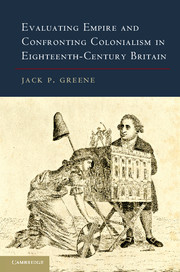Book contents
- Frontmatter
- Contents
- Preface Confronting Empire
- Prologue “Scene of a Foul Transaction”
- 1 “The Principal Cornucopia of Great-Britain's Wealth”
- 2 Outposts of “Loose Vagrant People”
- 3 “A Fabric at Once the Dread and Wonder of the World”
- 4 Arenas of “Asiatic Plunder”
- 5 Sites of Creolean Despotism
- 6 “A Fruitless, Bloody, Wasting War”
- 7 “This Voraginous Gulph of Hibernian Dependence”
- 8 A “Shadow of Our Former Glory”?
- Epilogue “Against Every Principle of Justice, Humanity, and Whatever is Allowed to be Right Among Mankind”
- Index
- References
2 - Outposts of “Loose Vagrant People”
The Language of Alterity in the Construction of Empire
Published online by Cambridge University Press: 05 June 2013
- Frontmatter
- Contents
- Preface Confronting Empire
- Prologue “Scene of a Foul Transaction”
- 1 “The Principal Cornucopia of Great-Britain's Wealth”
- 2 Outposts of “Loose Vagrant People”
- 3 “A Fabric at Once the Dread and Wonder of the World”
- 4 Arenas of “Asiatic Plunder”
- 5 Sites of Creolean Despotism
- 6 “A Fruitless, Bloody, Wasting War”
- 7 “This Voraginous Gulph of Hibernian Dependence”
- 8 A “Shadow of Our Former Glory”?
- Epilogue “Against Every Principle of Justice, Humanity, and Whatever is Allowed to be Right Among Mankind”
- Index
- References
Summary
During a House of Commons debate in November 1775 over what, in light of its army's misadventures in Massachusetts the previous spring, Britain should do to deal with colonial resistance to metropolitan authority, William Innes, M.P. for Ilchester, spoke at length in favor of strong coercive measures. Emphatically questioning whether the colonists were even “the offspring of Englishmen, and as such entitled to the privileges of Britons,” he denounced them rather as a promiscuous “mixture of people” who consisted “not only…of English, Scots, and Irish, but also of French, Dutch, Germans innumerable, Indians, Africans, and a multitude of felons from this country.” Few members of such a population, he insisted, could possibly have a legitimate claim to status as full Britons deserving of the rich inheritance and identity enjoyed by independent people in the home islands. Colonial Americans, he charged, had created and continued to live in societies that bore little resemblance to that of the home island, citing in particular the massive importation of enslaved Africans and the “despotic” exploitation of them. Societies thus drawing their very “sustenance from the very bosom of slavery,” he declared, “surely [had] nothing in them similar to what prevails in Great Britain.”
In these remarks, Innes built upon a well-established, if diffuse, language of alterity that dated back to the earliest days of English overseas enterprise. In metropolitan Britain, the celebration of empire as an enormous stimulant to Britain's wealth and a major element in its international stature, and the conception of colonization as a noble enterprise to bring civilization to savage and rude new worlds had never been unqualified. If the colonies themselves had been an obvious boon to Britain, the settlers who inhabited them often seemed, to people who remained at home, far less worthy of praise. The discourses of empire that took shape in the late seventeenth and early eighteenth centuries often involved expressions of a heavy-handed skepticism about the character of the settlers who inhabited the plantations and the character of the societies that they created.
- Type
- Chapter
- Information
- Publisher: Cambridge University PressPrint publication year: 2013



